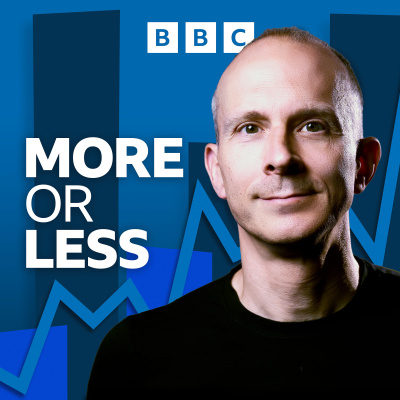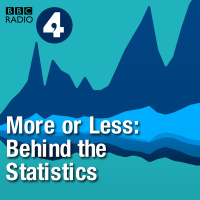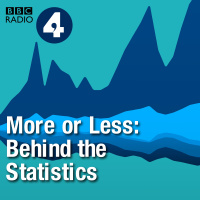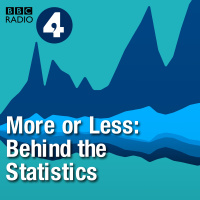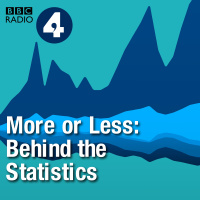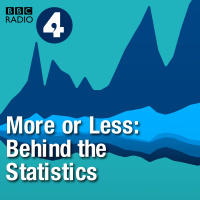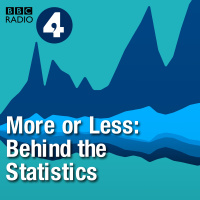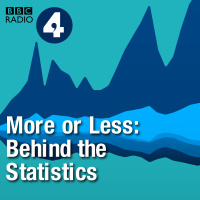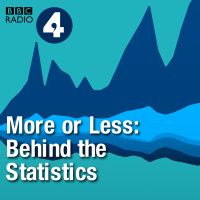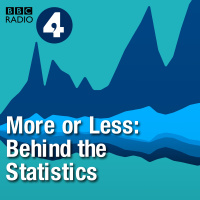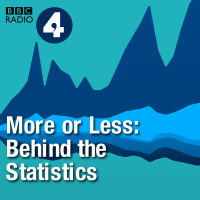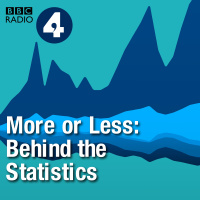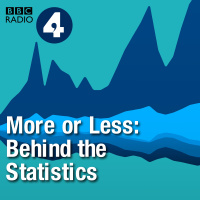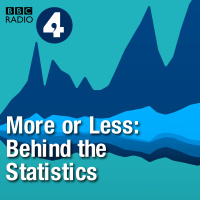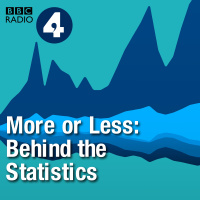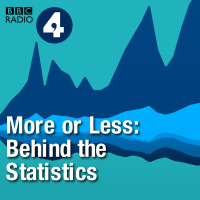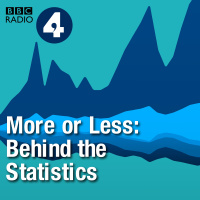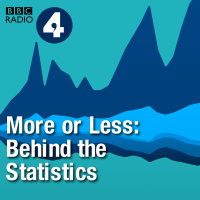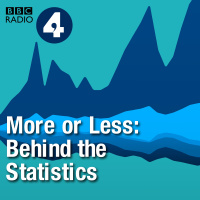Sinopsis
Tim Harford and the More or Less team try to make sense of the statistics which surround us. From BBC Radio 4
Episodios
-
How many butterflies are there in the world?
19/08/2023 Duración: 08minButterflies are a much-loved feature of summer in many parts of the world. But how many of them are there on Earth? That’s the question a young listener to More or Less wanted an answer to – and she couldn’t find the answer no matter how hard she searched the internet.Presenter Daniel Gordon enlists Professor Jane Hill, a butterfly expert at York University, England, who’s also President of the Royal Entomological Society, to try and help solve the mystery.He also consults Holly Mynott, International Officer of Butterfly Conservation, who describes the techniques used to run The Big Butterfly Count in the UK – the biggest event of its kind in the world.Producer/Presenter: Daniel Gordon Series Producer: Jon Bithrey Editor: Richard Vadon Production Co-ordinator: Brenda Brown Sound Engineer: Graham Puddifoot
-
Why is it so hard to predict the outcome of competitions like the Premier League?
12/08/2023 Duración: 09minFootball competitions are kicking off all around Europe in the coming days and weeks, including the world’s most watched division: The English Premier League. We might make our predictions on who we think is going to win a sporting competition but what factors are we considering? In this programme we look at some of the most popular variables that are taken into account when making sporting predictions and why even these have drawbacks. From upcoming football leagues to the Olympic Games, Head Analyst from Nielsen Gracenote, Simon Gleave tells us what are some of the most difficult sports to predict and why.Presenter: Paul Connolly Producer: Natasha Fernandes Editor: Richard Vadon Production Co-ordinators: Debbie Richford and Janet Staples Sound Engineer: Graham PuddifootImage: Premier League Trophy, Credit: Carl Recine/Reuters
-
Are the media exaggerating how hot it is in the Mediterranean?
05/08/2023 Duración: 08minReports on heatwaves across the globe have dominated our newsfeeds over the last few weeks, with temperatures said to have soared over the 40C mark in many parts of Europe. But across social media, not everyone is buying it. A trickle of scepticism swelled to a tidal surge, with people questioning whether temperatures are being hyped up by the wider media to drive fear and scare-monger. In this programme, we unpick allegations made about how these temperatures are recorded - and if they are accurate. We hear from Samantha Burgess at the Copernicus Climate Change Service; Alessandro Delitala from the Sardinia Environmental Protection Agency; and Sean Buchan from Climate Action Against Disinformation. Presenter: Paul Connolly Producer: Natasha Fernandes Editor: Richard Vadon Production Co-ordinator: Brenda Brown Sound Engineer: Rod Farquhar
-
Data, extreme weather and climate change
29/07/2023 Duración: 08minRecent global headlines have been dominated by record temperatures across Europe, North America and parts of Asia. As extreme weather events have happened for decades, how are links to climate change made? In this programme we look at how scientists use data to draw climate conclusions and hear how that data isn’t always available, with a focus on severe flooding earlier this year in part of Central Africa. With Joyce Kimutai, principal meteorologist and climate scientist at the Kenya Meteorological Department and researcher at the Grantham Institute for Climate Change, Imperial College.Presenter: Kate Lamble Producer: Nathan Gower, Jon Bithrey Editor: Simon Watts Production Co-ordinator: Brenda Brown Sound Engineer: Graham Puddifoot
-
Ukraine war: A new way of calculating Russian deaths
22/07/2023 Duración: 09minOfficial information on the numbers of dead and injured in the Ukraine war has been in short supply. Little has come from either the Ukrainian or Russian sides, with estimates from western governments and intelligence agencies filling the information void. But some Russian journalists have been documenting war deaths and have come up with a new way of estimating fatalities using probate records. With contributions from David Frenkel, reporter at Mediazona and the BBC’s Russian Service correspondent Olga Ivshina.
-
Are more adult nappies sold in Japan than baby ones?
15/07/2023 Duración: 09minJapan has one of the highest rates of life expectancy and one of the lowest birth rates. But does that mean that a widely circulated claim – that more nappies aimed at adults are sold in Japan than those made for babies – is true? With guests Sarah Parsons, Senior Teaching Fellow at SOAS in London and Dr Mireya Solis, Knight Chair in Japan Studies at the Brookings Institution.Presenter: Charlotte McDonald Reporter: Isobel Gough Producers: Isobel Gough, Jon Bithrey Sound Engineer: James Beard Production Co-ordinator: Brenda Brown
-
Does it take 10,000 litres of water to make a pair of jeans?
08/07/2023 Duración: 09minVarious claims have been made about how much water is used in the production of a pair of jeans, that cornerstone of casual clothing. With growing worries over the environmental impact of denim production, More or Less decided to investigate - with the help of journalist and researcher Elizabeth L. Cline who has written extensively on sustainability and the fashion industry. This programme was first broadcast in July 2022. Presenter: Tim Harford Producers: Lizzy McNeill, Jon Bithrey Programme Coordinator: Brenda Brown Sound engineer: Neil Churchill Editor: Richard Vadon (A worker sews blue jeans in a textile company in Xintang, China, dubbed the 'denim jeans capital of the world'. Photo: Lucas Schifres/Getty images)
-
Immigration: A More or Less Special Programme
05/07/2023 Duración: 28minMore than 1.2 million people came into the country to stay for more than 12 months in 2022. As only 560,000 left the country, this means net migration is at an all-time high. Both the Prime Minister and Home Secretary have said the number of people coming needs to come down. But who counts as an immigrant? How are the figures worked out? Charlotte McDonald will be finding out what the numbers tell us about who is coming to the UK and why. Plus - what about the people who left in 2022?
-
Will there be just 6 grandchildren for every 100 South Koreans?
01/07/2023 Duración: 09minAn article on the UK’s Telegraph newspaper website claimed that there would be just 6 grandchildren for every 100 South Koreans today. We ask whether that figure is correct and look at why South Korea’s birth rate has fallen to one of the lowest in the world, with the help of author and mathematician Rob Eastaway and journalist and author Hawon Jung.Presenter: Tim Harford Producers: Bethan Ashmead Latham, Jon Bithrey Editor: Richard Vadon Production Co-ordinator: Brenda Brown Sound Engineer: James Beard
-
Halving inflation, Scottish tidal power and have 1 in 3 women had an abortion?
28/06/2023 Duración: 31minOne of Rishi Sunak's five priorities for 2023 is to halve inflation. Given prices are still rising, we discuss whether it's going be possible. Also does Scotland have more tidal power capacity than the rest of the world combined, as has been claimed? We look at competing claims about how prepared the NHS was before the pandemic, ask whether scrapping VAT on products like tampons and e-books has actually benefitted consumers and look at the claim that one in three women in the UK has had an abortion.
-
US National Debt: is $32 trillion a big number?
24/06/2023 Duración: 08min‘This episode was updated on 26th June to remove an error in how we quantified 32 trillion dollars’ The level of US government debt has just surpassed 32 trillion dollars. Negotiations over raising the borrowing limit once again went down to the wire a few weeks ago. But how concerned should we all be about how much the US government borrows? We investigate with the help of Kent Smetters, professor at the Wharton School of the University of Pennsylvania and Betsey Stevenson, Professor of Economics and Public Policy at the University of Michigan.
-
Mortgages, birth rates and does space contribute 18% to UK GDP?
21/06/2023 Duración: 28minMortgage rates have risen to 6%. But are things as bad as when rates were much higher in the 1970s and 80s? We look at just how much pain today's rises mean. Also will there be just 6 grandchildren for every 100 South Koreans today? And we look into a claim that the space industry supports 18% of the UK's economy.Presenter: Tim Harford Series Producer: Jon Bithrey Reporters: Beth Ashmead Latham, Nathan Gower, Charlotte McDonald Sound Engineer: James Beard Production Co-ordinator: Brenda Brown
-
Is breastfeeding the key to exam success?
17/06/2023 Duración: 09minA new study by researchers at Oxford University has linked better exam results at school with being breastfed as a baby. But how much faith can we put in the findings? Tim Harford speaks to Emily Oster, professor of economics at Brown University in the US and the author of three books about pregnancy and parenting.
-
Electric vehicles, 600 million bottles and does oral sex cause cancer?
14/06/2023 Duración: 32minThere's been a lot of coverage about the risks electric cars may pose to infrastructure like bridges and car parks. We look at how much heavier EVs are. Plus we look at a new study that suggests a link between breastfeeding and improved grades at GCSE level. Also is throat cancer now primarily caused by a sexually transmitted disease - and are 600 million bottles going to litter Scotland because of disagreements with the UK government over the new Deposit Return Scheme?
-
Counting Hunger in India
10/06/2023 Duración: 09minHow prevalent is hunger and malnutrition in India? With Indian data journalist Rukmini S, we interrogate recent claims that hunger has worsened dramatically in recent years, and explore how malnutrition affects child mortality in the world’s most populous country.Presenter: Tim Harford Producer: Nathan Gower Editor: Richard Vadon Programme Coordinator: Brenda Brown Sound Engineer: Neil Churchill
-
Lib Dem ambulance claims, affordable rent and goat meat
07/06/2023 Duración: 28minThe Liberal Democrats say 120 people a day in England died last year whilst waiting for an ambulance. We investigate whether the claim stands up to scrutiny. Also Rishi Sunak's pandemic-era scheme Eat Out To Help Out is back in the spotlight. How much did it really contribute to a second wave of infections? We look at a claim that no single woman in England on an average salary can afford to rent a home of her own. And Jonathan Agnew said on Test Match Special that goat is the most eaten meat in the world. Is he right?Presenter: Tim Harford Series Producer: Jon Bithrey Reporters: Jo Casserly, Nathan Gower Editor: Richard Vadon Sound Engineer: James Beard Production Co-ordinator: Brenda Brown(Woman looking for a flat to rent. Credit: Oscar Wong/Getty images)
-
A short history of data
03/06/2023 Duración: 09minWe live in a world where data is everywhere – informing if not governing our lives. But this wealth of data didn’t just turn up overnight. Tim Harford talks to academics Chris Wiggins and Matthew Jones, whose new book How Data Happened aims to explain how the world we know today has been shaped by not just technological developments but battles around how emerging sources of data should be utilised.
-
Food prices, net migration and beef about beef
31/05/2023 Duración: 30minDoes Britain really have the most affordable food in Europe? That's a recent claim of the President of the National Farmers' Union. We ask if it's true and look in detail at what is driving rising food prices in the UK. We also try and make sense of the latest net migration figures, ask if dating apps are making Gen Z more single and explain why a correction to a correction on Radio 4's Farming Today wasn't quite right.
-
Are young people more single than ever before?
28/05/2023 Duración: 08minWhat’s the definition of being single – and how easy is it to measure? There’s a perception that young people today are more single – in a relationship sense - than ever, and dating apps are to blame. But how true is that? Ellie House investigates, with the help of Marina Adshade of the Vancouver School of Economics. Presenter: Ellie House Producers: Ellie House, Jon Bithrey Editor: Richard Vadon Sound Engineer: Rod Farquhar Production Co-ordinator: Brenda Brown
-
NHS waiting lists, Voter ID and measuring divorce
24/05/2023 Duración: 28minThe government has trumpeted a big fall in those waiting over 18 months for hospital treatment in England. But total numbers on waiting lists have hit a new high. Also we look at how much impact the introduction of Voter ID had on turnout in May's English local elections. We ask whether Portugal really has a divorce rate of 94%. And we remember mathematician Dr Vicky Neale of Oxford University, who has died at the age of 39. The government has trumpeted a big fall in those waiting over 18 months for hospital treatment in England. But total numbers on waiting lists have hit a new high. Also we look at how much impact the introduction of Voter ID had on turnout in May's English local elections. We ask whether Portugal really has a divorce rate of 94%. And we remember mathematician Dr Vicky Neale of Oxford University, who has died at the age of 39.Presenter: Tim Harford Series Producer: Jon Bithrey Reporters: Josephine Casserly, Octavia Woodward, Ellie House Sound Engineer: James Beard Production Co-ordinator: B
